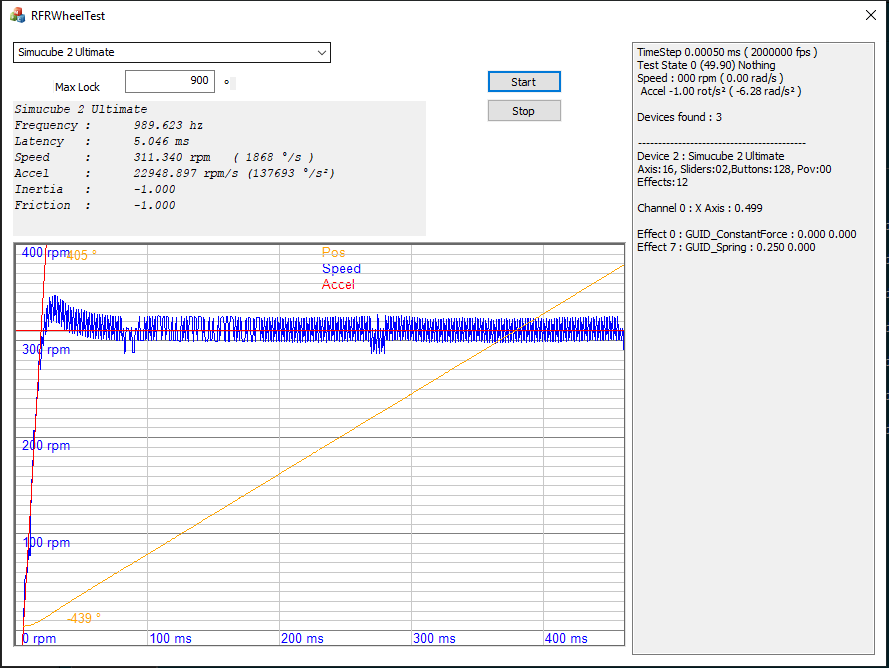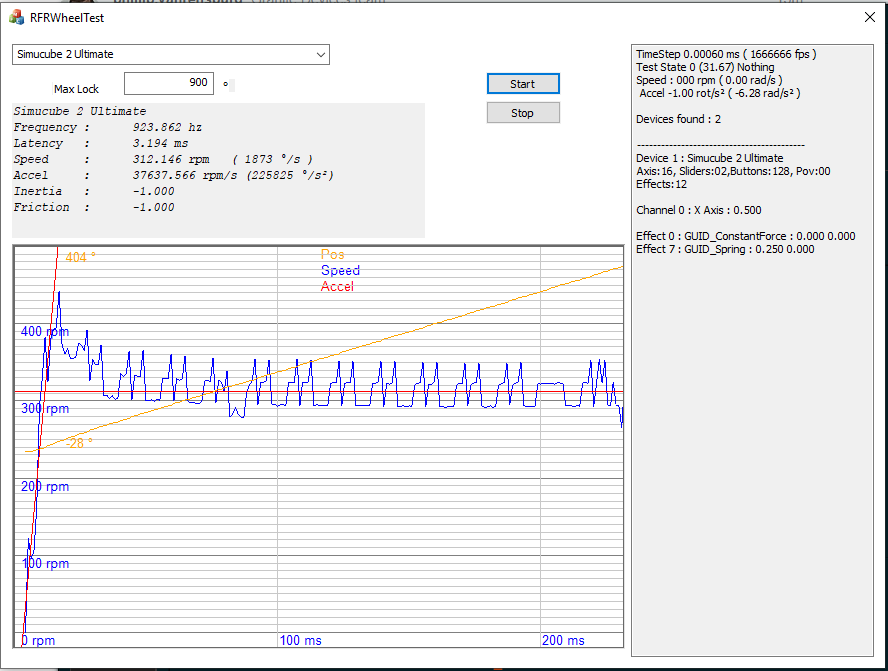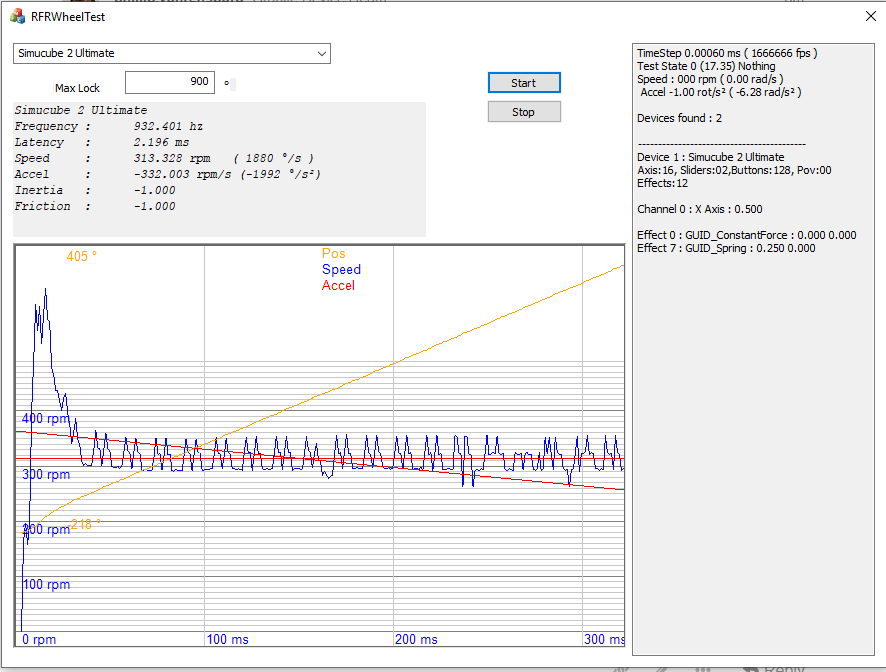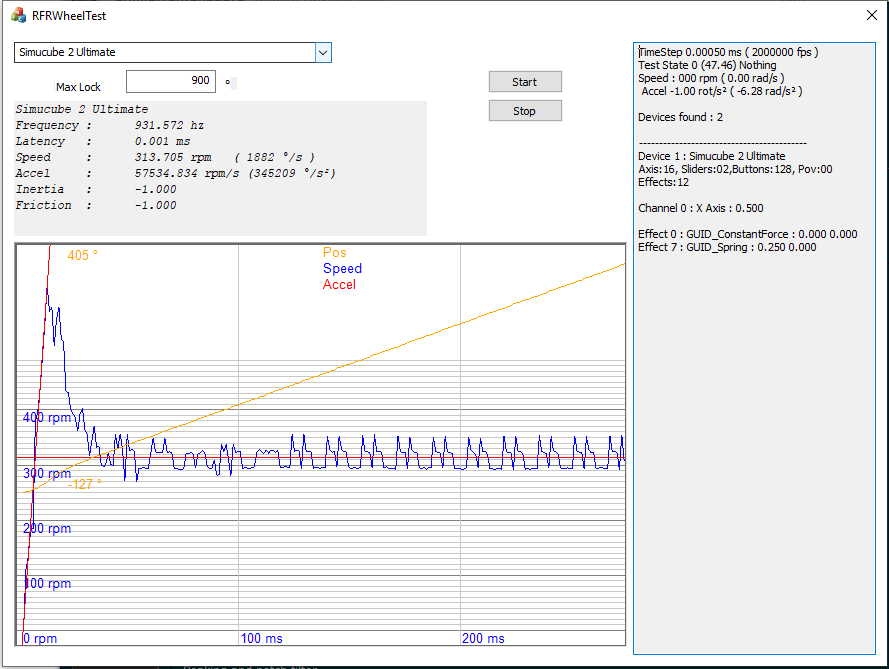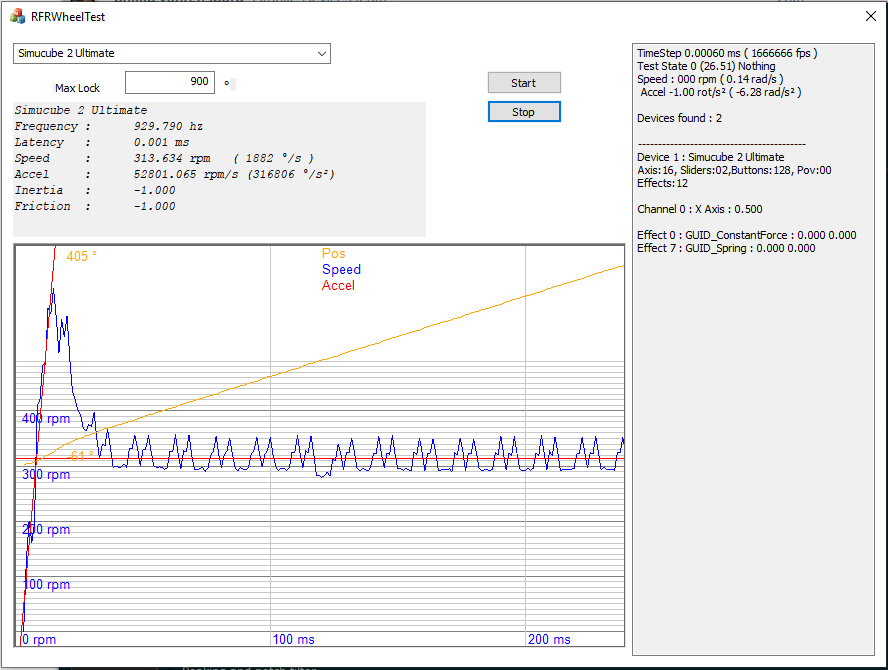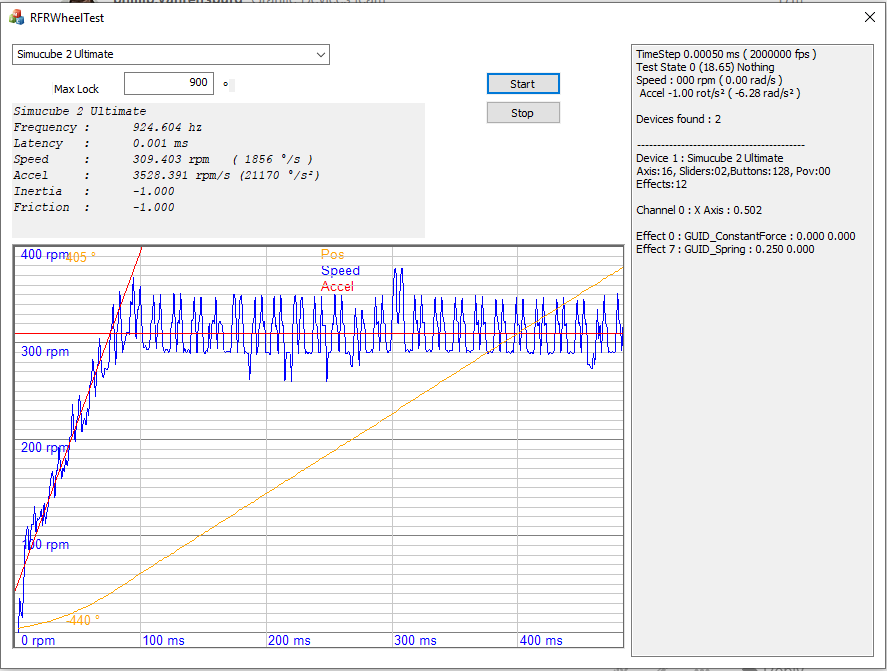this test is not accurate for anything really.
If I understand correctly, these tests are trying to show raw caracteristics of motors/electronics ; that is why they are done without any filters. That’s not exactly how you are supposed to use these wheels in real case scenario even if good performance is related to good FFB. All these wheels might work way below their full potential for the best ingame simulation value. This tests cannot evaluate the benefits of the software.
The Fanatec show a very strong acceleration, but seems behind the competition with latency. The curb present some overshooting, maybe it is partly due to the shape of the steering wheel attached (F1 2018LE)?
@Mika, could you please develop why it is bad and what would be a good test?
there are computer-specific variance in usb latency, also depends on what other usb devices are connected. Also, the friction of the overall system affects the initial acceleration somewhat, making variances especially to the latency measurement.
Also the rim being used has an effect, although that is smaller effect with DD wheels.
Ok for the usb part, but could you please tell me what is described in the “overalll system”?
Aren’t Direct Driven wheels supposed to have negligeable friction? I am wondering about the actual influence of the friction here because the belt driven Beckhoff with VSD+STM32+MMos (non-integrated) shows a latency of 2.09ms (so less than SC1 and SC2Pro) and because the Podium DD1 shows as much latency than a belt-driven CSW V2.5 (around 20ms).
In the end, what type of test should be representative/fair? The same test with the various motors on the very same PC, without any other USB devices than mouse and keyboard and without any steering wheel attached? Or a way to measure latency at different points and not only at the start of command until the initial acceleration?
This test is not accurate? Can you prove it somehow or you just guessing? Ppl use this test for years so good to know why you think so…
GD did their own extensive testing in various servos so I would imagine that they have a well established set of testing criteria that they drew on.
Once the results are finally published we will hopefully have a much better idea on the differences found between them all.
Mika already gave some feedback above as to why, here is a comment I made on the same topic on iRacing also. Just because people have been using the test for years, doesn’t make it any more meaningful or accurate.
[quote] To be totally fair, like said on GD forums too, we cannot use these tests in random environment like this, way to many variables.
The only way to conduct these would be in a controlled environment - same pc, same USB ports used, same Windows environment, as well as same wheel-rim, as wheel-dia and relative weight will all massively impact these results. For example, I have a small 4nm 60mm Mige servo here that can run 1000rpm at 48Vdc that will destroy any other servo on that list posted on GD wrt acceleration, I will guarantee that…but, as a DD wheel, it is totally useless.
Anyway, I have mentioned to Thomas during my early beta testing that I thought the wheel was to active and sitting on the limit wrt stability, what we call quarter-wave damping tuning… that response-behaviour confirms it to some degree, but it is something that can be corrected by proper low-level tuning.
Again, above just a simple observation, like said, if you want meaningful results, it might be much wiser testing all servos in same environment, perhaps even without any wheel-rim attached, then we might be able to draw conclusions from that.
But, in reality, there are better ways to test the response-behaviour from the servos themselves, as well as isolate the performance of the drive-controllers, USB HID et al…these software test-progs are not good enough and results will need to be taken with a bag of salt ![/quote]
Thank you Phillip for this post but for the systems that are not useless and finished products, it still is interesting to see how they behave in different environments since these are the environment of end users that will use it. We just need to see multiple results. Lots of people did the test and results were coherents despite differences in the overall system.
Won’t you post your latency test? We promise to take it with a bag of salt!
What about latency? What about distortions we can see on diagrams? Is it useless too?
Mirek,
Final Latency will be very much influenced by things like local PC USB controller performance in Windows environment, number of USB devices, even the OS state itself.
Like I have mentioned before, the only way to get statistically representative tests if at least the same exact environment is used for all tests, I.e one user with the same pc testing all different wheels.
Personally, I as much as anyone else would like to see the DD wheels we own, are the best - but, to make that determination based on flawed testing methodology, doesn’t proof anything at all.
The way I go about things, is to actually test these against each other in real life. That’s how I determine performance, reduced latency, overall feel and I even open up the devices to look at build quality, components used and speed of processors.
Some arbitrary tests from different people on the Internet has no value to me, if I may be that honest.
PS: I have given my feedback about the (too) active control-behaviour at setpoint change on the Podium wheel too, it is a lower-level tuning issue that should be able to be tuned out. So let’s not pin our hopes on that.
There are real practical reasons why Simucube2 is better than any other DD wheel on the market, I don’t need RFR wheel test to tell me that 
I think if you love SIM racing and you love SIM racing toys and you have the expendable income for those toys, then buy the shiny new stuff!
If it makes you happy and you get thousands of hours of amazing moments with friends then $1000-2000 is really a small price to pay for a primary hobby.
I always reference the ‘mountain bike’ comparison, because if you have ever gotten into that hobby then you will find that buying a Simucube2 is a far cheaper hobby 
Have fun doing what you love, if you can afford it and it makes your life that little bit happier then I say buy it.
Until someone comes back to say otherwise, we are all a LONG time dead.
If I wasn’t perfectly happy with my SC1 and my setup I would absolutely consider it, but I’ve recently finished my ‘ultimate’ SIM rig (SimLabs P1 Black) and I’m gonna wait until game developers actually start recognizing the need for the insane resolution potential of these DD wheels before buying something that I’m sure is ‘better’ but really splitting hairs.
If I was coming from a consumer grade Fanatec, Thrustmaster unit then sure, the SC2 would be in my house right now.
Have fun!
Here is my test anyway, fwiw. Testing with and without the rim only impacts the Accel anyway, as well as overshoot. I believe that shot of the Podium might be without a rim perhaps, or a very light rim.
I suspect if I choose different usb ports on mine, it will affect the latency.
And a few more with this brilliantly repeatable and reliable software 
Same pc, different usb controller, This time, all filters disabled…so, which one to pick, guys?
Great answer… Thx Beano  But… on the first diagram u have 989 usb frequency and this is correct, but on the others you have only 923-932 frequency, too low, so we can easy see there is something wrong with usb, thats why there are so strange diagrams. Did u use USB HUB? How did u do that? With RFR WheelTest we can try to find the best USB controler we have in our PC, and we can test USB 2.0 or 3.0 PCI-E cards like StarTech. Looks like USB frequency is very important.
But… on the first diagram u have 989 usb frequency and this is correct, but on the others you have only 923-932 frequency, too low, so we can easy see there is something wrong with usb, thats why there are so strange diagrams. Did u use USB HUB? How did u do that? With RFR WheelTest we can try to find the best USB controler we have in our PC, and we can test USB 2.0 or 3.0 PCI-E cards like StarTech. Looks like USB frequency is very important.
Hi Mirek,
First test was on the std motherboard USB port. The subsequent tests however, I was using the ports on my hi-speed USB pci-express card, with a dedicated controller per each port. Even the results were a bit strange, the latencies were generally lower. But note the variance across the 4 ports on that card…the card I have is the costly Startech USB 3.0 card, see here: https://www.amazon.com/gp/product/B00HJZEA2S/ref=ppx_yo_dt_b_asin_title_o01_s00?ie=UTF8&psc=1
That’s why I say, if we want to compare results between different dd wheels, the only way to do it basically would be to test all on the same pc, on the same port, perhaps even going as far as to restore the same OS image between tests.
But, with that said, a more scientific way would be the backroom tests guys like Tero at GD is doing…I cannot go into more detail, but those are pretty scientific and based on empirical maths/data/results, as opposed to the variability of sw across a spectrum of pc’s and associated variables…
Love it. I always reference my friends who play golf or play in bands. They’ll spend thousands on a new guitar even though they have 5 already, or a new set of clubs at countless thousands because they think they will play better. Me, photography. I shudder when I add up the cost of my photography equipment!
Mountainbikes and guitars? Try Harley-Davidson… 
Try the actual track car comparison. 
In a single weekend alone you’ll blow through a couple sets of tires, each will probably set you back ~300 - 500 bucks (depending on the quality).
Wish tyres were as cheap as that over here 
